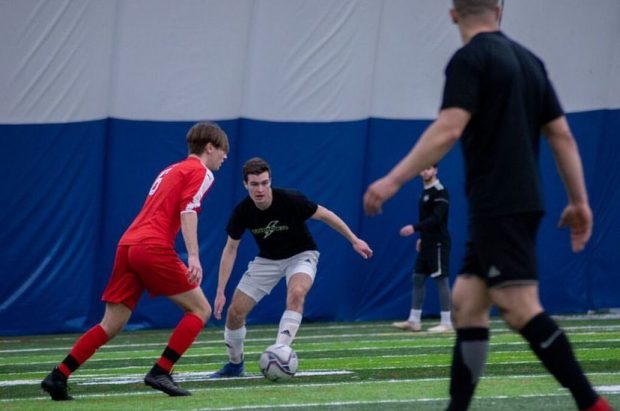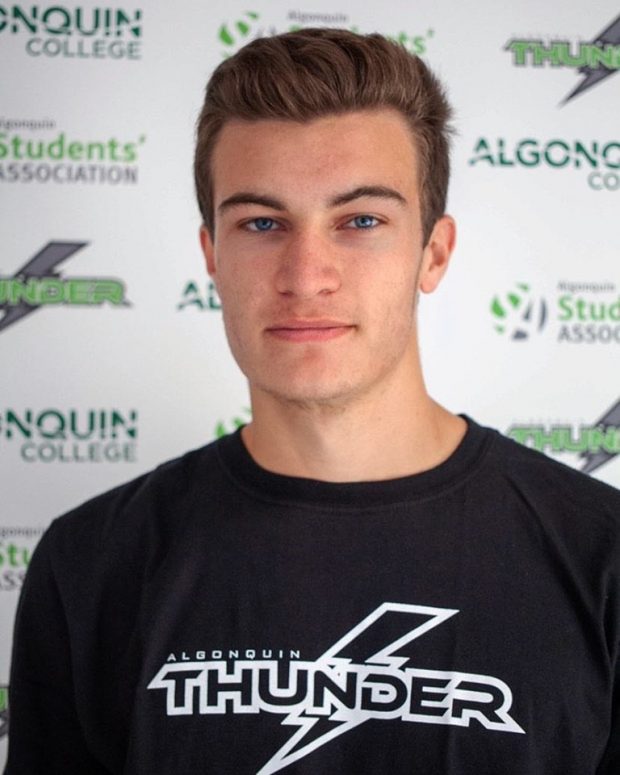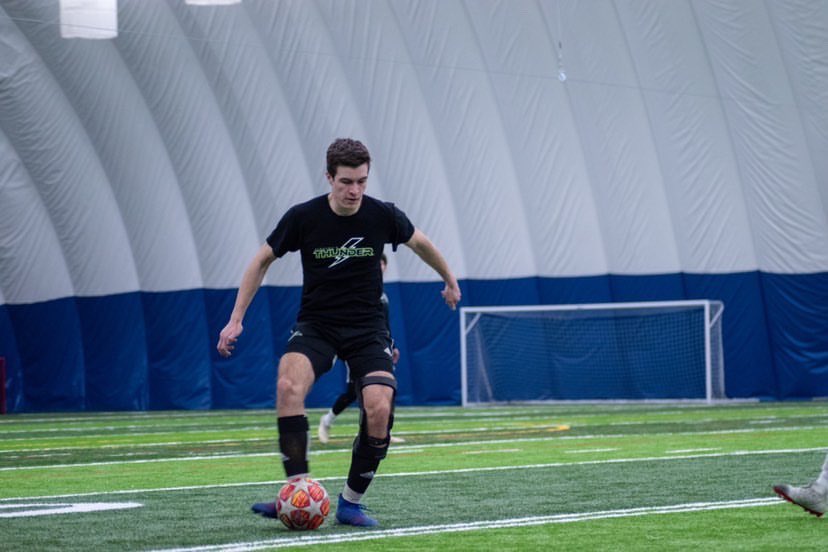Normally at this time of year, Nicolas Bisaillon would be training and playing soccer with teammates, getting ready for the upcoming Algonquin College soccer season. However, this spring the Algonquin College Thunder soccer player and computer engineering student is stuck at home training alone, without soccer.
“It’s our own intensity so we have to be motivated by ourselves and we can’t work on team aspects so we just have to adapt to the situation and work with what we have and do our best with that,” Bisaillon said.
Like many in Canada, Algonquin Thunder athletes have been affected by COVID-19 and the restrictions that come with it. This includes shutting down in-person team training and meetings.
Those restrictions also meant shutting down the Algonquin College Athletics facilities on March 16.
However, while the Algonquin College community continues to look ahead to the future despite the challenges and uncertainty, its athletes are continuing to persevere by staying in shape while training at home. For Bisaillon, it means individual workouts.
Over time, he realized more and more how serious the situation would be.
“At first, I thought the situation wouldn’t be too bad,” he said. “I thought Canada is a healthy country and then three weeks ago, they started closing down everything so I thought it’s going to be pretty serious. We’re used to training usually once a week during the offseason as a team and it’s really good high-intensity.”
His training routine includes fitness and weight training. He has a home gym, including a treadmill, which he uses to do interval training.
Mentally for him, it’s about staying organized and motivated to train. That’s one of the challenges that comes from being away from teammates.
“You have to stay motivated, you have to make sure you make plans through the week,” Bisaillon said. “It’s way easier to train when you’re as a team. You’re all there helping out each other but now, we’re on our own pretty much and we just have to make sure we carry that focus point and get all the work done.”
One of the things Bisaillon does to stay focused is telling friends and siblings his plans and goals for the week. He said he also finds that writing down his goals also helps him get training done.
The workouts are simple for him but he can’t do soccer specific training with teammates.
“You don’t need much space. All you need is weights pretty much,” he said. “The soccer stuff is hard because you need a field, you need everything else. You need teammates so that’s the hard part but through lifting weights, I’ve done my cardio-wise. You can still run outside so I used to love to do that so those are the easiest parts.”
He also misses the social aspect outside of soccer of being able to interact with friends.
“It’s also all the fact that the activities you do walking to school, busing, hanging out, going downtown,” he said. “All that activity, also playing other sports just for fun, those are activities to make friends and to keep yourself in shape so that’s also some of the things you can’t do. It’s not only soccer. We can’t do the entire aspect of it, like stuff for fun and hanging out with friends.”

Algonquin rugby player and police foundations student Taha Chahrour is in the similar situation. He works out at home while not being able to play rugby.
Chahrour said that with rugby cancelled, he can’t play on club teams, in tournaments or at the Ontario team trials that he would usually do.
He doesn’t have access to a gym at home so he’s been doing full body workouts and circuit training. Chahrour called it a new type of training regime he’s not used to.
“I love pushups and pullups due to them hitting all upper body parts in two simple workouts,” he said.
Chahrour said that while he’s “fully immersed” in his new lifestyle, he wishes he could go back to his old lifestyle. His days now consist on walking up, drinking coffee, eating meals, working out and watching cat videos. He said he does 100 pushups an hour.
However, he said he misses playing rugby. This includes working on new skills as he and his team prepare for the upcoming season. This also includes seeing his teammates. “I miss the comradery and the ability to see my skills get better,” he said. “Without the training, my rugby skills are declining.”
The team aspect is something Bisaillon misses as well.
“Obviously, with time, it’s going to get more and more boring if you’re always training on your own,” he said. “The fun part of soccer I find is playing with your teammates, having fun, playing games and stuff like that.”

While he and his teammates would usually be training in indoor domes at this time of year, the domes have been shut down.
In the meantime, he and his teammates still watch game film – of both their own play and of professional games. “The only thing is that it’s harder because there’s no new games and we’re not playing so we can’t watch live stuff,” he said.
Nutrition-wise, he said that while he’s eating a little less because he’s not working out as much as he usually would.
“Grocery stores are still open, you can still cook,” he said. “If you want to eat out, you can still take food out. I think I’m eating about the same, just maybe a little less calories because I’m at home a bit more.”
He’s also been making sure not to work out too much. “You do have to balance soccer training and then you have to move onto something else,” he said. “You have to analyze games or other things. You can’t just be working out for three, four hours. You’re going to burn yourself out.”
While most of the Algonquin College sports seasons have already concluded by February, the 2020 OCAA Indoor Soccer Championship was cancelled after initially, according to Ian Campbell, the Thunder’s coordinator of communications and events.
“A notice came out from the league that day that ‘only essential personnel be permitted at any OCAA sanctioned event; including student-athletes, coaches, trainers, team staff, convenors and host staff. All other persons will be prohibited until further notice,’” Campbell recalled. “They also planned to scrap the traditional post-game handshake. However, on March 20 the situation had evolved to the point that the 2020 OCAA Indoor Soccer Championship was officially cancelled.”
Campbell said it would have been devastating if COVID-19 hit earlier in the season.
“This time of year is always a bit of a valley in terms of team activity. It would have been a far different scenario had the pandemic hit between September and February,” said Campbell.
Campbell said there is a lot of uncertainty with planning going forward given the fluid situation with COVID-19.
“You are kind of moving ahead as best you can without a lot of solid answers in terms of timelines or knowing exactly what is going to happen, so you are trying to prepare for a few different possible scenarios all while being ready to adjust your plans if the situation changes,” he said.
This includes uncertainty about future games for the upcoming season.
Campbell said that while this is a quiet time of the year for all the teams, the outdoor sports teams could be affected the most. “They finished their seasons back in November and with the change in season coming, they might be getting antsy to get outside again,” he noted.
One of the events cancelled is the in-person varsity athletic banquet. Campbell continued to do work preparing the awards online.
“So, when I went home from Algonquin when we closed our facilities down, not a lot changed for me in terms of my work flow because it was all banquet-related work and that’s largely done on my laptop,” Campbell recalled.
“Our banquet was scheduled for Thursday, April 9 and at that point events had not been cancelled, so I went on about my work. Even when we reached the point where the actual banquet had been cancelled, there was still lots of work to do. In fact, because the banquet was cancelled and we were to be locked out of the college, the online celebration of our season and delivery of our award-winners seemed that much more important to me because that was all our athletes were going to get this year.”
One of the things that the athletes and coaches are missing out on is face-to-face interaction. Campbell also misses it as part of his job.
“At a personal level, I think it is the loss of the face-to-face interactions,” he said. “The ones with coworkers and the ones with students. There are functions we carry out in our jobs and we can continue to do most of those remotely, but there is a human aspect to what we do as well, and that is lacking right now.”
Campbell has been keeping busy with work but the lack of face-to-face interaction within the Thunder community stands out.
“It isn’t easy being away from everyone,” he said. “I miss my coworkers. I miss our athletes. I miss the random interactions of the day at the college that give life flavour and as much as technology can help us stay in touch and keep the wheels turning, there is just no substitute for human interaction.”
There is uncertainty about next season with nothing certain about upcoming schedules, according to Campbell.
“We are in the midst of a world event right now and I think it would be foolish to make any guarantees,” he said. “I’ve read articles online suggesting that large scale concerts and sporting events may not make a return to North America until 2021 when a vaccine is expected to be ready.”
Another question is what would constitute a safe environment for athletes to return to action, according to Campbell.
“We don’t get thousands of people at our games, but would a packed gym be a totally safe environment? Would an outdoor rugby match in open air be safer? I don’t know the answer to those questions, but they are on my radar, so we’ll wait and see where we are at as time goes on,” he said.
Part of the process involves consulting and working with different organizations to give the okay to proceed with next season.
“It goes without saying that the federal, provincial, and city governments, not to mention Algonquin College and the Students’ Association, need to tell us it is okay to run the season before we could do so,” he said. “There are a lot of parties that need to say ‘yes’ before a decision even gets down to our level. I know your article is about the [Wolves] point-of-view, but this story is just so much bigger than us. We can only follow it where it takes us.”
Campbell has doesn’t know if the teams have individual offseason training plans.
“I have noticed a few of our athletes posting videos of themselves being active during the lockdown and also athletes and coaches posting pictures from this past season and mentioning how much they miss their teams right now, but I haven’t heard anything directly,” he said.
Bisaillon doesn’t know when he’ll be able to get back into training with his teammates. He said that due to the athletes already working out at home, it won’t take long for everyone to get back into shape for soccer.
“It’s also offseason so we don’t have to be at the best fitness,” he said. “Usually we start getting in shape start of the summer so it’s around that time where we all start stepping it up but if everyone’s been doing their thing, it should be fine, only a week or two. If people are out of shape, it would show and it wouldn’t help the team very much.”
One thing he does know is that when he and his teammates return to playing, there will be an excitement to get back to playing the sport they love.
“I know everyone on our team is so excited to get back to playing,” he said. “After the first week, we were already bored of not playing soccer so I think everyone’s definitely going to be more excited and the intensity’s going to be even higher because we all want to play that much more, knowing how much we miss not having soccer.”


